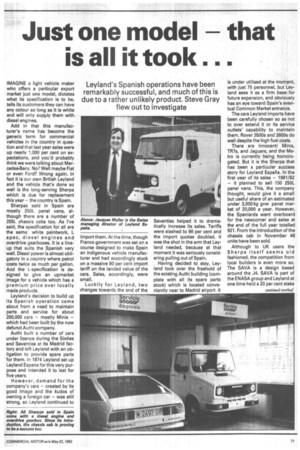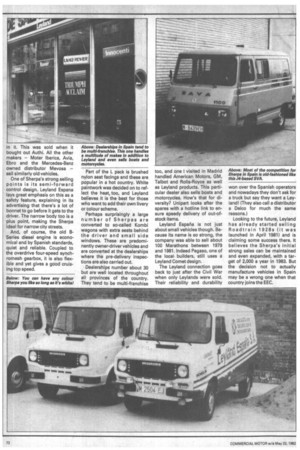Just one model that is aH it took .
Page 63

Page 64

If you've noticed an error in this article please click here to report it so we can fix it.
Leyland's Spanish operations have been remarkably successful, and much of this is due to a rather unlikely product. Steve Gray flew out to investigate
IMAGINE a light vehicle maker who offers a particular export market just one model, dictates what its specification is to be, tells its customers they can have any colour so long as it is white and will only supply them with diesel engines.
Add in that this manufacturer's name has become the generic term for commercial vehicles in the country in question and that last year sales were up nearly 1,000 per cent on expectations, and you'd probably think we were talking about Mercedes-Benz. No? Well maybe Fiat or even Ford? Wrong again. In fact it is our own British Leyland and the vehicle that's done so well is the long-serving Sherpa which is due for replacement this year — the country is Spain.
Sherpas sold in Spain are mostly 250L panel vans, although there are a number of 255L chassis cabs too. As I've said, the specification for all are the same: white paintwork, L spec, diesel engines and overdrive gearboxes. It is a lineup that suits the Spanish very well. Diesel power is almost obligatory in a country where petrol costs twice as much per gallon. And the L-specification is designed to give an upmarket image for a vehicle which has a premium price over locally made products.
Leyland's decision to build up its Spanish operation came about from a need to maintain parts and service for about 200,000 cars — mostly Minis — which had been built by the now defunct Authi company.
Authi built a number of cars under licence during the Sixties and Seventies at its Madrid factory and left Leyland with an obligation to provide spare parts for them. In 1974 Leyland set up Leyland Espana for this very purpose and intended it to last for five years.
However, demand for the company's cars — created by its good image and the kudos of owning a foreign car — was still strong, so Leyland continued to import them. At the time, though Franco government was set on a course designed to make Spain an indigenous vehicle manufacturer and had accordingly stuck on a massive 90 per cent import tariff on the landed value of the cars. Sales, accordingly, were small.
Luckily for Leyland, two changes towards the end of the Seventies helped it to drama tically increase its sales. Tariffs were slashed to 66 per cent and the import quotas doubled. It was the shot in the arm that Leyland needed, because at that moment it was seriously considering pulling out of Spain.
Having decided to stay, Leyland took over the freehold of the existing Authi building complete with all its spare parts stock) which is located conveniently near to Madrid airport. It is under utilised at the moment, with just 75 personnel, but Leyland sees it as a firm base for future expansion, and obviously has an eye toward Spain's eventual Common Market entrance.
The cars Leyland imports have been carefully chosen so as not to over extend it or its service outlets' capability to maintain them. Rover 3500s and 2600s do well despite the high fuel costs.
There are Innocenti Minis, TR7s, and Jaguars, and the Metro is currently being. homologated. But it is the Sherpa that has been a particular success story for Leyland Espana. In the first year of its safes — 1981/82 — it planned to sell 150 250L panel vans. This, the company thought, would give it a small but useful share of an estimated under 3,000 kg gvw panel market of 20,000 a year. However, the Spaniards went overboard for the newcomer and sales at the end of the full year totalled 921. From the introduction of the chassis cab in November 46 units have been sold.
Although to UK users the Sherpa itself seems old fashioned, the competition from local builders is even more so. The SAVA is a design based around the J4. SAVA is part of the ENASA group and Leyland at one time held a 20 per cent stake in it. This was sold when it bought out Authi. All the other makers — Mater lberica, Avia, Ebro and the Mercedes-Benz owned distributor Mevosa — sell similarly old vehicles.
One of Sherpa's strong selling points is its semi-forward control design. Leyland Espana lays great emphasis on this as a safety feature, explaining in its advertising that there's a lot of bonnet to go before it gets to the driver. The narrow body too is a plus point, making the Sherpa ideal for narrow city streets.
And, of course, the old BSeries diesel engine is economical and by Spanish standards, quiet and reliable. Coupled to the overdrive four-speed synchromesh gearbox, it is also flexible and yet gives a good cruising top speed. Part of the L pack is brushed nylon seat facings and these are popular in a hot country. White paintwork was decided on to reflect the heat, too, and Leyland believes it is the best for those who want to add their own livery or colour scheme.
Perhaps surprisingly a large number of Sherpas are converted to so-called Kombi wagons with extra seats behind the driver and small side windows. These are predominently owner-driver vehicles and are converted at the dealerships where the pre-delivery inspections are also carried out.
Dealerships number about 30 but are well located throughout all provinces of the country. They tend to be multi-franchise too, and one I visited in Madrid handled American Motors, GM, Talbot and Rolls-Royce as well as Leyland products. This particular dealer also sells boats and motorcycles. How's that for diversity? Unipart looks after the spares with a hotline link to ensure speedy delivery of out-ofstock items.
Leyland Espana is not just about small vehicles though. Because its name is so strong, the company was able to sell about 100 Marathons between 1979 and 1981. Indeed Pegaso, one of the local. builders, still uses a Leyland Comet design.
The Leyland connection goes back to just after the Civil War when only Leylands were sold. Their reliability and durability won over the Spanish operators and nowadays they don't ask for a truck but say they want a Leyland! (They also call a distributor a Delco for much the same reasons.) Looking to the future, Leyland has already started selling Roadtrain 1928s (it was launched in April 1981) and is claiming some success there. It believes the Sherpa's initial strong sales can be maintained and even expanded, with a target of 2,000 a year in 1983. But the decision not to actually manufacture vehicles in Spain may be a wrong one when that country joins the EEC.






























































































